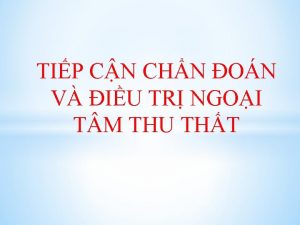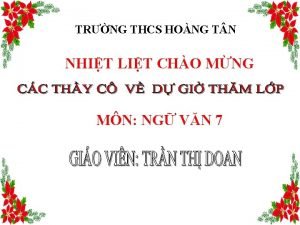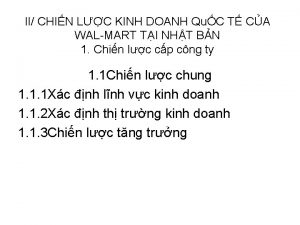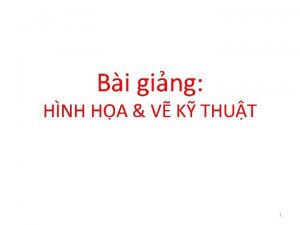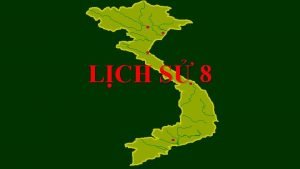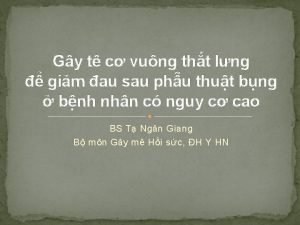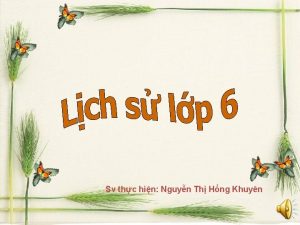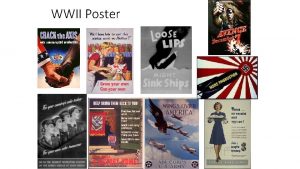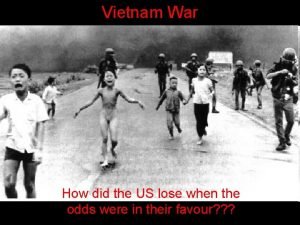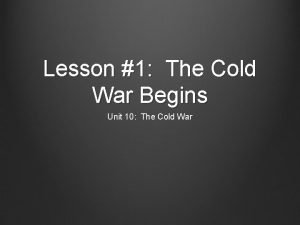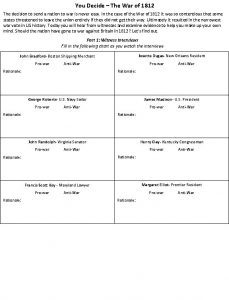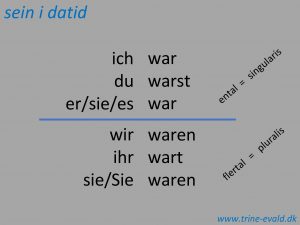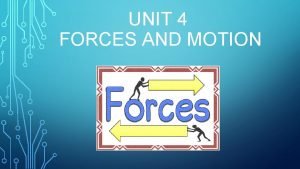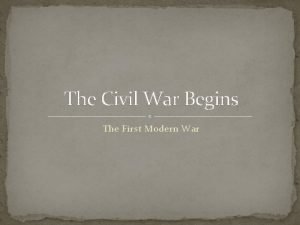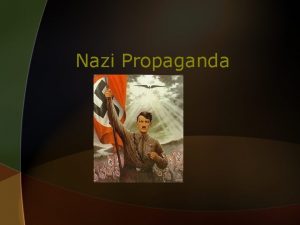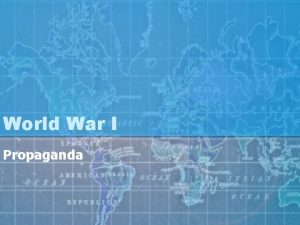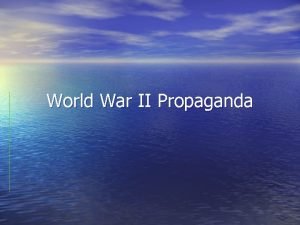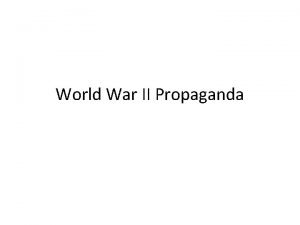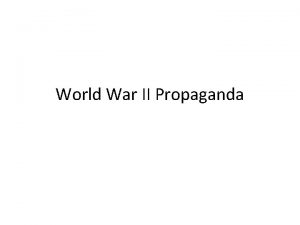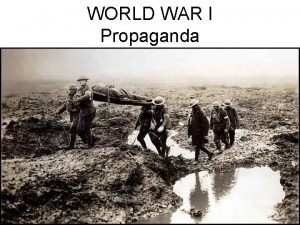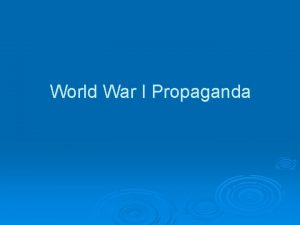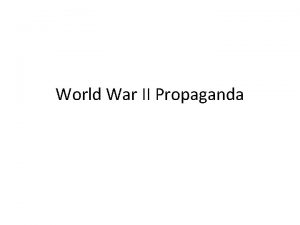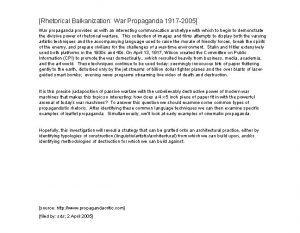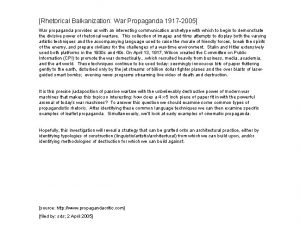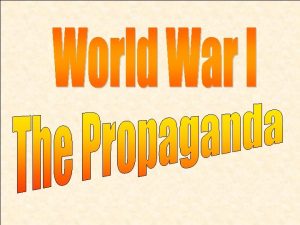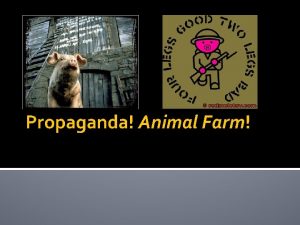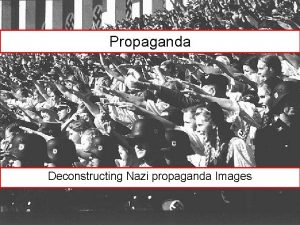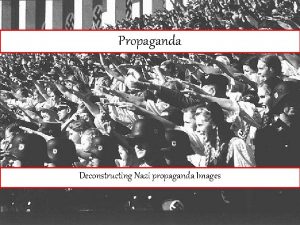World War II Propaganda Propaganda n information that



















- Slides: 19

World War II Propaganda

Propaganda n information that is spread for the purpose of promoting some cause n In WWII, propaganda was used more than any other time this world has seen. With new technological inventions such as photography, radio and film, manipulative messages bombarded every day life in an attempt to persuade a person to believe in a specific cause.

United States – Uncle Sam: I Want You! Russia – Look familiar?



Women in WWII n n n Women responded to the urgent demand for their labor 5 million women entered the work force replaced the men who joined the armed services. n Married and single women worked as reporters, truck driers, factory workers and aircraft workers. They also typed telegrams and went overseas as nurses and pilots.

U. S. Home front Propaganda When the United States finally entered the war, it was Total War. Everyone was affected and as many resources possible went to the war effort.

Buy War Bonds! n n n What is being symbolized here? Think about how fear can be used in propaganda. Notice the two unknowing kids and the oldest who seems to be looking at something up in the sky.

Rationing n n During the war, the government rationed (limitations on the amounts of certain goods that people could buy) essential items such as sugar, gasoline, coffee, meat, and even ketchup. Citizens were given ration books to keep track of the “points” allotted to each family.

Saving Gas

Victory Garden n n Nationwide victory garden program to help combat food shortages. Victory gardens made an important contribution to the home-front effort by producing a significant amount of food (approximately 40 percent of the vegetables consumed in 1943) and by providing a way to contribute to the war effort for those who could not fight on the battlefield.

Collecting Scrap n To help win the war, families, even children, went to the streets to collect scrap metal, paper, rubber—anything that could be recycled to help win the war. Salvage (saving) in WWII SAVE… 30, 000 razor blades CAN BE MADE INTO… 50 machine guns (. 30 caliber) 30 lipstick tubes 20 ammunition cartridges 2, 300 pairs of nylons 1 parachute 1 pound of fat 1/3 pound of gunpowder 2, 5000 tons of 5, 000 tanks tin and 190, 000 tons of steel

Women: Rosie the Riveter n n n Rosie Riveter is one of the most popular posters ever created in the United States. What does the arm symbolize? What about her facial appearance/expression?


Unification It is important for any government in war that all the people be united in the war effort. Even black people and women were targeted by propaganda in the United States. How might this create lasting effects after the war?

African Americans at War n n On July 19, 1941, the U. S. Air force began a program in Tuskegee, Alabama to train black Americans as military pilots. Army was segregated n n only whites were allowed to fly 992 black pilots graduated, receiving commissions and pilot wings. n Tuskegee Airmen.

Mexican Americans n U. S. needed worker n 1942: signed a treaty with Mexico n allowed the recruitment of Mexican laborers to work in the U. S. n Bracero Program n many Mexicans moved north to work on farms and railroads.

Discrimination of Mexicans n June 1943 n a group of sailors on leave attacked some young Mexican Americans n beat them on the streets n teens wearing zoot suits n rioting in Los Angeles. Newspapers blamed the violence on the Mexican Americans. n Police even left the servicemen along and arrested the victims

Japanese
 Phân độ lown
Phân độ lown Block nhĩ thất độ 2 mobitz 2
Block nhĩ thất độ 2 mobitz 2 Thơ thất ngôn tứ tuyệt đường luật
Thơ thất ngôn tứ tuyệt đường luật Thơ thất ngôn tứ tuyệt đường luật
Thơ thất ngôn tứ tuyệt đường luật Chiến lược kinh doanh quốc tế của walmart
Chiến lược kinh doanh quốc tế của walmart Tìm vết của mặt phẳng
Tìm vết của mặt phẳng Hãy nói thật ít để làm được nhiều
Hãy nói thật ít để làm được nhiều Tôn thất thuyết là ai
Tôn thất thuyết là ai Gây tê cơ vuông thắt lưng
Gây tê cơ vuông thắt lưng Sau thất bại ở hồ điển triệt
Sau thất bại ở hồ điển triệt What propaganda technique is used in the poster
What propaganda technique is used in the poster Techniques used in world war ii propaganda
Techniques used in world war ii propaganda War at home and abroad madison
War at home and abroad madison Korean war vietnam war venn diagram
Korean war vietnam war venn diagram The cold war lesson 1 the cold war begins
The cold war lesson 1 the cold war begins Reconstruction plans venn diagram
Reconstruction plans venn diagram Was josette dugas pro war
Was josette dugas pro war Ich war du
Ich war du Balanced force
Balanced force Why was the civil war considered the first modern war
Why was the civil war considered the first modern war
